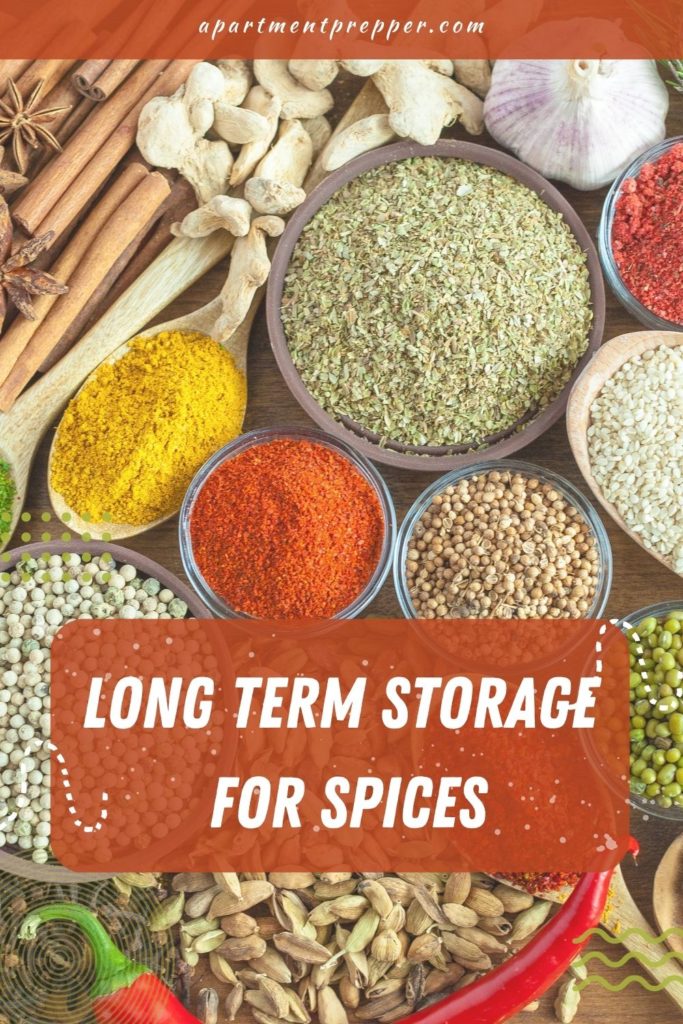Written by Bernie Carr
Spices are essential for enhancing the flavor of food; they are also useful as home remedies. I stored spices back in 2013, and now only recently started opening up my stored spices. Because I stored them carefully, they retained their flavor, even after 10 years of storage.
Let’s look at ways tips for long term storage for spices.
Identify your favorite spices
Take a few days to list the spices you use the most. I use a lot of garlic powder, onion powder, pepper, cinnamon, oregano, and cumin. These are the spices I bought in bulk and stored. Now that I’m using them, I’ll be replacing these stored spices shortly.
Do spices spoil?
Yes, spices can spoil if improperly stored. After about a year, they gradually lose their flavor and nutrients, especially if the packaging was already opened.. They may even have an “off” taste.
Another problem about keeping spices in open packaging for a long time is that bugs can get into them. You’ve seen weevils in flour; well, they can get into spices too. That’s why it’s important to store spices properly to avoid these issues.
What is the normal shelf life of spices?
Store-bought spices usually come with a “best by” date or expiration date. If you grow herbs and dry them, it is difficult to predict how long they will last. As an estimate, ground spices last for about a year to two years when they are left in the original packaging. Whole spices may last about two to four years, if left unopened.
Plain table salt, on the other hand, does not expire. I have also stored salt for many years. This post shows how I stored salt.
What if you consume expired spices?
I’ve used expired spices I’ve had in my pantry many times and nothing happened. As long as it’s clean and dry, with no mold or moisture in them; however, they are likely to be less flavorful than fresh spices.
Long term storage for spices
Storing spices properly is essential in maintaining their quality and flavor over time-follow these tips to store your spices for the long term.
Choose the right container
I stored my spices in Mylar bags and labeled them. Use the smallest Mylar bags to store spices. Small glass jars that have a tight seal such as Mason jars are also good for storing spices.
Use oxygen absorbers
Oxygen absorbers help extend the shelf life of food (and some medicines) by removing the oxygen inside the package. They activate as soon as they are exposed to air. For storing spices, I’d also add oxygen absorbers in the storage container.
Keep spices in a cool, dry place
Heat and light are enemies of food storage. Spices, like other foods, should be stored in a cool, dry place, away from direct sunlight and heat sources such as the stove or oven. After I packaged the spices, I placed them in a re-sealable five-gallon bucket. A pantry or cupboard away from heat is a good location.
Should you store spices in the fridge or freezer?
The humidity in the fridge and freezer can cause spices to lose their flavor and aroma quickly. The spices may also pick up smells from other items in the freezer. Because they are usually in small packages, you are likely to forget about it among the rest of the fridge and freezer contents.
Label your containers
Label your spice containers with the date of purchase and the name of the spice. This will help you keep track of which spices need to be used first and avoid confusion when cooking.
Avoid storing near strong odors
Store spices away from strong-smelling foods. Strong-smelling foods such as fresh onions and garlic bulbs can affect the flavor of your spices, so store them separately.
Buy whole spices
Whole spices, such as cumin seeds, cinnamon sticks, and whole peppercorns, last longer than ground spices. You can grind them as needed for recipes.
The final word
Spices are probably not among the first items you should think about storing for an emergency but they do have a place in your emergency pantry. Even if you are not too concerned about preparedness, buying spices at a discount and storing them for later use will save you money in the long run. Storing spices properly will help ensure your spices will stay fresh longer, so you avoid wasting money.
If you found this article interesting or helpful, please consider helping us out (without costing you anything)! We are an affiliate of Amazon.com, which means we received a small commission if you click through one of our Amazon links when you shop, at totally no cost to you. This helps keep the lights on at the blog. Thanks!
About the author
Bernie Carr is the founder of Apartment Prepper. She has written several books including the best-selling Prepper’s Pocket Guide, Jake and Miller’s Big Adventure, The Penny-Pinching Prepper and How to Prepare for Most Emergencies on a $50 a Month Budget. Bernie’s latest e-book, FRUGAL DIY has just been released on Amazon. Her work appears in sites such as the Allstate Blog and Clark.com, as well as print magazines such as Backwoods Survival Guide and Prepper Survival Guide. She has been featured in national publications such as Fox Business and Popular Mechanics. Learn more about Bernie here.
FB: https://www.facebook.com/apartmentprepper
Instagram: https://www.instagram.com/apartmentpreppers/
Twitter: https://twitter.com/AptPrepper
YouTube: https://www.youtube.com/channel/UC7vOtdbo-wiBeBxD6puCr1Q
Pinterest: https://www.pinterest.com/aptprepper/


